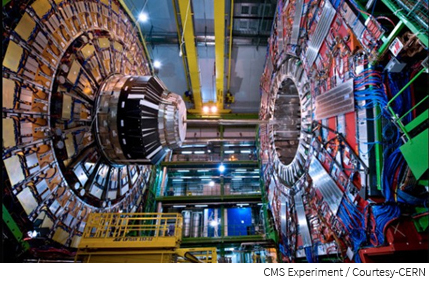CERN – European Organization for Nuclear Research
|
General Description CERN (Centre Européen pour la Recherche Nucléaire) is one of the largest and most prestigious research organisations in the world. By colliding particles at very high energies and traveling near the speed of light, CERN physicists and engineers explore the basic constituents of matter. They use the biggest and most complex scientific instruments ever built on Earth. CERN employs around 2700 staff members but there can be over 13’000 people from over 100 countries on site at any one time. In 2011, after 10 years of construction, the Large Hadron Collider (LHC) started operating using the 27 km diameter tunnel and infrastructure built for the earlier LEP accelerator (LEP, the Large Electron Positron collider, 2000-2009). At present, the LHC beam energy is 13 TeV. To extend its discovery potential, the LHC will be upgraded to increase its luminosity (rate of collisions) by a factor of 10 beyond the original design. The CERN High Luminosity LHC project (HiLumi HL-LHC project) was approved by the CERN Council in June 2014 and the project completion is scheduled for 2024. Particles generated from the main LHC injector source can also be directed to other experimental facilities on the CERN site. Founding year: 1954 Founding members (12): Belgium, Denmark, France, Germany, Greece, Italy, Netherlands, Norway, Sweden, Switzerland, United Kingdom and Yugoslavia. Members (22): the list of member countries with their 2019 budget contributions can be found here. Budget CERN 2019: 1'170 MCHF Swiss financial contribution: pro rata of the Swiss GNP ~4.1 % Swiss geo-return 2018: value for Supplies is 4.4 (4.3 in 2017) and for Industry services 7.5 (7.5 as well in 2017). Swiss research institutions involved: ETHZ, EPFL, PSI, Uni BS, GE, BE and ZH. Procurement policy The accounting currency at CERN is the Swiss Franc. CERN purchases goods and services in relation to its own procurement rules. CERN does not follow EU procurement rules. CERN's Procurement rules define two adjudication principles for contracts: "lowest compliant" (for Supplies) or "best-value-for-money" (for Industry Services). Contracts are awarded to suppliers by a selective tendering procedure depending on the contract value:
Only Market Survey (MS-xyz) are announced on CERN procurement webpage. Market Survey (MS-xyz) are announced on the Swiss ILO Tender page if they are considered to be relevant to the Swiss high-tech industry. Construction and civil engineering calls, service calls and procurement calls for reseller activites (IT, COTS electronics) are not announced. Adjudication rules and Geographical Return CERN applies "re-alignment rules" for the award of contracts exceeding 100kCHF to technically and financially qualified bidders. The re-alignment rules are based around the geo-return for CERN Member States. The geo-return value is smoothed over 4 years.
The status of poorly balanced and well balanced Member States is published each year on 1 March using procurement data from the previous year. The status for realignment rules currently in force, that is between 01.03.2017 and 28.02.2018, is shown here. CERN can provide exclusive tenders to Member States that are very poorly balances, without notifying other Member States.
|

CERN Projects
|

